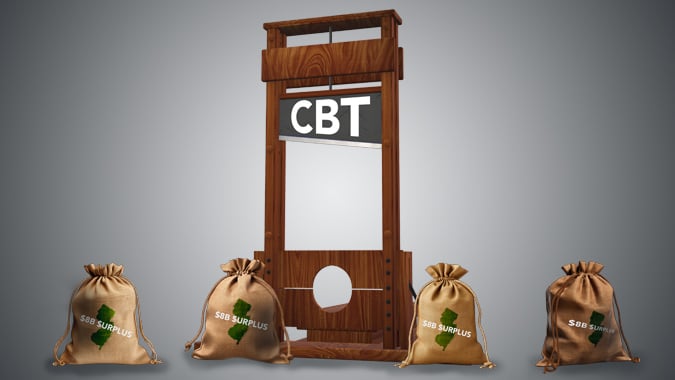At a press event outside the Statehouse on Thursday, progressive groups said it would not be a punishment on business for New Jersey to reinstate a 2.5% Corporation Business Tax surtax after allowing it to sunset just a few weeks ago.
But NJBIA Vice President of Government Affairs Christopher Emigholz explained why it would be the very definition of punitive, particularly with the state having a multi-billion-dollar surplus in its coffers.
“It’s always interesting that these groups never mention New Jersey had been paying the highest top corporate business tax rate in the nation prior to the sunset of the surtax, nor that our corporations are still paying the fourth highest CBT rate in the nation even without it,” Emigholz said.
“And that’s on top of all the other top taxes and regulatory burdens that New Jersey businesses pay.
“So, if the state, after just a few weeks, decided to reverse course and raise taxes yet again on businesses, no matter what their size, during a time of an $8 billion surplus, what else would you call it other than punitive? It would simply send a direct message here and to the business community nationwide that New Jersey businesses can’t trust their state’s leadership. And that’s a culture you want to avoid at all costs.”
Gov. Phil Murphy is scheduled to make his 2025 FY Budget presentation on Tuesday, amid concerns of softening revenues.
As recently as last week, the governor listed the reasons why he would not reverse course on reinstating the CBT surtax.
As noted in an op-ed by NJBIA President and CEO Michele Siekerka last week, New Jersey’s fourth-highest CBT rate is also underscored by the highest property taxes in the nation and the fourth highest top income tax rate.
Additionally, New Jersey businesses were hit with a more-than $1 billion unemployment insurance tax increase without any federal COVID relief to offset that increase, as most states had.
New Jersey businesses have also been excluded from any property tax relief from the ANCHOR and Stay NJ programs, even though they pay nearly half the property taxes in the state annually.
Pennsylvania, on the other hand, is slashing its top corporate business tax rate in half to 4.9% – and still funding its transit system without corporate taxes.
“We, unfortunately, have come to expect progressive groups to present a very skewed side of an argument, without any facts or context of what businesses of all sizes have to deal with being here in the state,” Emigholz said.
“What’s more important is our legislators understanding the full story when going through the budget process, which is why we will continue to be as proactive as we have been in detailing that New Jersey businesses are paying much more than their ‘fair share’ when it comes to taxes.”
Surplus Support
Emigholz also noted that progressive groups have a fundamental misunderstanding of the policy purpose of a surplus.
“Having a healthy budget surplus is a good thing that Governor Murphy deserves credit for, but it is not a policy goal in and of itself,” Emigholz said. “A surplus is an important budget tool to help the state stabilize spending and tax levels during a dip in revenues. That stability is the policy goal even if it means the surplus temporarily dips as it is designed to.
“Properly utilizing a historically large surplus helps us avoid a so-called austerity budget, which we are not, to my knowledge, in jeopardy of getting to, because it could help cover important spending on things like education and transportation when revenues are down.
“It also helps us avoid a tax hike to make us less competitive when revenues are down. Over time, natural economic growth will lead to organic revenue growth and the surplus will build back up without New Jersey having had to cut spending or increase taxes – which should be everyone’s goal.”

